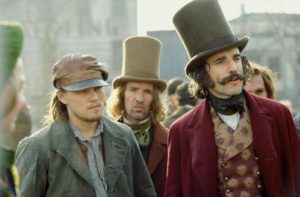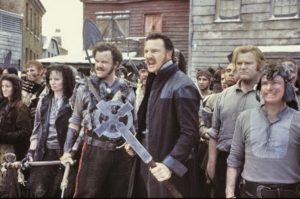Director Martin Scorsese’s “Gangs of New York” is a purposeful and definitive look at gang life in New York City during the epoch of the Civil War. It’s not a look at the types of gangs that commit lawlessness during an otherwise peaceful society, but a look at gangs that exist amidst a lawless society. It’s a society where might and power rule, where immigrants and ‘natives’ fight over who has they right to exist in the city. It pits two such men against each other, acted by Daniel Day-Lewis and Leonardo DiCaprio to perfection. While the film suffers from familiar slights of many of Scorsese’s other films – namely a too long run-time, the film is poignant in its drama and its thorough portrait of historical New York.
While the scope of this film is ambitious, its plot is simplistic and raw – boiled down to a straight revenge film ensconced amidst NYC’s changing landscape. DiCaprio plays Amsterdam Vallon, son of Priest Vallon (Liam Neeson) who was killed years prior by the enigmatic villain Bill the Butcher (Day-Lewis). Sent away after a violent gang fight that ends in Priest Vallon’s death, Amsterdam returns as an adult, to get reacquainted with the ‘5 points’ and, of course, to avenge his father’s death.
“Gangs of New York” has two strong assets – its acting and it’s total immersion in it’s aged period, both of which are executed flawlessly. We see a NYC of desolation and despair – not one of modern times where cars fly down 42nd street and Broadway – but one of dirty roads, despicable hovels of existence, and complete lawlessness that fill its streets. Houses catch on fire, and instead of being put out by fire brigades, are raped and pillaged by gangs and hoodlums. One such house is emptied before the major gangs (such as ‘The Natives,’ run by The Butcher) arrive, so Boss Tweed (Jim Broadbent) turns the gangs’ attention to a house that isn’t even on fire, it’s tenant punched in the face as his house is ransacked before his eyes.
 Much of the plot of “Gangs of New York” revolves around Amsterdam as he attempts to work his way into The Butcher’s good graces, and the faux companionship between Bill and Amsterdam. Bill’s prowess is seen through favors and acts of serious violence. “Amsterdam…I’m New York. Don’t you ever come in here empty-handed again. You have to pay for the pleasure of my company,” he warns. But it isn’t long before Bill is showing Amsterdam the tricks of the trade, the art of the kill, and gives him a thorough and engrossing tour of his 5 Points.
Much of the plot of “Gangs of New York” revolves around Amsterdam as he attempts to work his way into The Butcher’s good graces, and the faux companionship between Bill and Amsterdam. Bill’s prowess is seen through favors and acts of serious violence. “Amsterdam…I’m New York. Don’t you ever come in here empty-handed again. You have to pay for the pleasure of my company,” he warns. But it isn’t long before Bill is showing Amsterdam the tricks of the trade, the art of the kill, and gives him a thorough and engrossing tour of his 5 Points.
“Gangs” works due to the great chemistry that DiCaprio and Day-Lewis have together, who play off each other in different ways. Both have starred in stellar films (DiCaprio “Titanic” and “Blood Diamond,” Day-Lewis in the fantastic “In the Name of the Father”), and work together easily here. Although Bill despises foreigners, specifically the Irish, he takes a liking to Amsterdam, seeing something of himself in him. But for most of the film he plays the fool to realizing Amsterdam has only one goal in mind – to see him dead.
Racism and utter hatred of immigrants runs deep throughout this film, as we see early scenes of Irish being ‘welcomed’ with rocks thrown at their heads and mountains of verbal abuse. This is of course interspersed with enclaves of other nationalities hunkering together for support amidst the lawless 5 Points. They fear for their lives, all the more so as the Civil War reaches closer and closer to home. Bill throws a knife at a poster of Abraham Lincoln in one poignant scene, infuriated with the ‘rights’ African-Americans have in his eyes. “We should have run a better man against Lincoln when we had the chance,” he scoffs.
 We’re introduces to a host of characters in this film, all who fill their roles well. There’s Brendan Gleeson, a once Irish gang member who now has aspirations of Sheriff. There’s also a long-time friend of Amsterdam’s, Johnny (Henry Thomas), and a love interest in the name of Jenny Everdeane, played with skill and cunning by Cameron Diaz. Additional players, such as John C. Reilly, Gary Lewis, and Stephen Graham round out the cast.
We’re introduces to a host of characters in this film, all who fill their roles well. There’s Brendan Gleeson, a once Irish gang member who now has aspirations of Sheriff. There’s also a long-time friend of Amsterdam’s, Johnny (Henry Thomas), and a love interest in the name of Jenny Everdeane, played with skill and cunning by Cameron Diaz. Additional players, such as John C. Reilly, Gary Lewis, and Stephen Graham round out the cast.
Of course the plot develops with twists and turns, but to speak of these is to give too much away. “Gangs’” chief strength is its cohesive script, it’s intricate period piece treatment, and its score and progression, both of which are ominous and grim. Amsterdam and Bill’s rivalry – detailed with care and, oddly, respect, is a high point of the film, but not the point. This is a thorough and encapsulating movie to watch. It’s as beautifully filmed as it is tough to watch, and its only real criticisms lay in its 2 hour and 47 minute run-time. A trip to the editing room may have been somewhat nicer on the eyes.
All in all, however, “Gangs of New York” is a well written and well acted film that holds up over time as an entertaining and stark account of life in New York circa 1863. A definite recommend.
– by Mark Ziobro


